1893-1894 - The University of North Carolina at Chapel Hill
1893-1894 - The University of North Carolina at Chapel Hill
1893-1894 - The University of North Carolina at Chapel Hill
You also want an ePaper? Increase the reach of your titles
YUMPU automatically turns print PDFs into web optimized ePapers that Google loves.
APPENDIX. 199<br />
troops in these'sliipf^ and those in the Arr/o was the difference <strong>of</strong> drinking<br />
w<strong>at</strong>er. <strong>The</strong> l<strong>at</strong>ter were exceptionally supplied with w<strong>at</strong>er. Avhich<br />
was said to have an unpleasant smell and taste, from a marsh near Bona;<br />
those on the other shii)s were supplied Mith good w<strong>at</strong>er. Finally the<br />
ninelsoldiers on the Argo who escaped were said to have i)urrliased wholesome<br />
w<strong>at</strong>er from the crew <strong>of</strong> th<strong>at</strong> vessel."<br />
In an article by Dr. Bartley, on the "Rel<strong>at</strong>ion <strong>of</strong> W<strong>at</strong>er to Paludal<br />
Poisoning," in the Brooklyn Medical Journal, and republished in the<br />
<strong>North</strong> <strong>Carolina</strong> Medical Journal for February, <strong>1893</strong>, these cases are quoted:<br />
"<strong>The</strong> villages <strong>of</strong> AVarrington and Woolsey, in Florida, had been considered<br />
healthy places up to 1872. After th<strong>at</strong> they became very malarious.<br />
Previous to th<strong>at</strong> d<strong>at</strong>e almost the whole w<strong>at</strong>er supply had been from a<br />
spring <strong>of</strong> pure w<strong>at</strong>er. About 1872 driven wells became popular, as w<strong>at</strong>er<br />
could be had <strong>at</strong> a depth <strong>of</strong> a few feet (italics mine), and mo.st <strong>of</strong> the residents<br />
had their own wells. From this time malaria became very prevalent,<br />
and it is believed from the change in the w<strong>at</strong>er supply." Again:<br />
"In January, 18(i(3, a company <strong>of</strong> forty healthy marines were sent to the<br />
Navy Yard <strong>of</strong> Pensacola, Fla. During the first year frequent <strong>at</strong>tacks <strong>of</strong><br />
malaria began to show themselves among these men, which increased in<br />
number during the second year, and during the third year the disease<br />
became so prevalent th<strong>at</strong> before August twenty-five <strong>of</strong> the party were in<br />
the hospital <strong>at</strong> one time. During this year they were so broken down<br />
th<strong>at</strong> they were all sent to Norfolk, Va., where they all recovered. <strong>The</strong>se<br />
marines drank the w<strong>at</strong>er from a driven well <strong>at</strong> the yard. <strong>The</strong> <strong>of</strong>ficers<br />
and their families drank only from a cistern, and no case <strong>of</strong> malaria<br />
appeared among them, proving th<strong>at</strong> the wells were probably the cause<br />
<strong>of</strong> the sickness among the marines." Dr. Bartley also quotes this from<br />
the Sanitarian, 1892: "In 187o the Naval Hospital <strong>at</strong> Pensacola was<br />
rebuilt.<br />
It proved to be a very unhealthy place, malarial diseases being<br />
very commonly contracted by p<strong>at</strong>ients and all othei-s who came there.<br />
This continued until 1890. At this time there was a change in the w<strong>at</strong>er<br />
supply. A cistern was constructed, and the use <strong>of</strong> well w<strong>at</strong>er from the<br />
driven wells was abandoned, with the cess<strong>at</strong>ion <strong>of</strong> malarial <strong>at</strong>tacks.<br />
<strong>The</strong> soil <strong>at</strong> the loc<strong>at</strong>ion <strong>of</strong> the hospital is composed <strong>of</strong> a sandy to]) with<br />
a swampy marl underne<strong>at</strong>h. This pe<strong>at</strong>y soil contains organic m<strong>at</strong>ter,<br />
and in some way produced ti)ese diseases." Likewise this: "In the<br />
report <strong>of</strong> the Marine Hospital Service for 1890, page 12, signed by Surgeon<br />
General Hamilton, he says: '<strong>The</strong> experience <strong>of</strong> the past year confirms<br />
the previous st<strong>at</strong>ement th<strong>at</strong> malarial diseases are contracted<br />
through the medium <strong>of</strong> food and drinking w<strong>at</strong>er."<br />
In the April number <strong>of</strong> the >Si)iiiliei'ii.<br />
Sl<strong>at</strong>es there appeared a very interesting<br />
article by I\Ir. James R. Randall on "Malaria Superstition and the<br />
W<strong>at</strong>er Problem." While not jirepared to indorse Mr. Randall in the<br />
opinion th<strong>at</strong> the malarial poison is not introduced into the system <strong>at</strong> all<br />
through the air, but through the drinking w<strong>at</strong>er onli/, I am much pleased



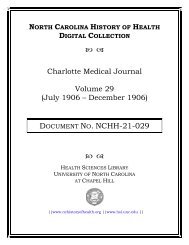
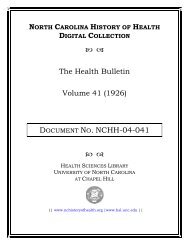
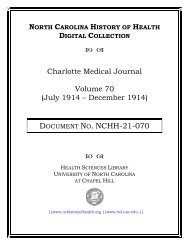
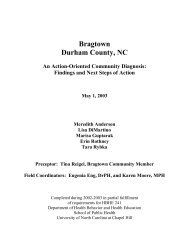
![Bulletin of the North Carolina Board of Health [serial] - University of ...](https://img.yumpu.com/48032016/1/153x260/bulletin-of-the-north-carolina-board-of-health-serial-university-of-.jpg?quality=85)
![The Health bulletin [serial] - University of North Carolina at Chapel Hill](https://img.yumpu.com/47603625/1/169x260/the-health-bulletin-serial-university-of-north-carolina-at-chapel-hill.jpg?quality=85)
![The Health bulletin [serial] - University of North Carolina at Chapel Hill](https://img.yumpu.com/47242858/1/169x260/the-health-bulletin-serial-university-of-north-carolina-at-chapel-hill.jpg?quality=85)
![The Health bulletin [serial] - University of North Carolina at Chapel Hill](https://img.yumpu.com/43204263/1/172x260/the-health-bulletin-serial-university-of-north-carolina-at-chapel-hill.jpg?quality=85)
![The Health bulletin [serial] - University of North Carolina at Chapel Hill](https://img.yumpu.com/41981074/1/163x260/the-health-bulletin-serial-university-of-north-carolina-at-chapel-hill.jpg?quality=85)
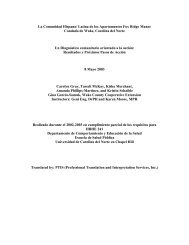
![The Health bulletin [serial] - University of North Carolina at Chapel Hill](https://img.yumpu.com/40912928/1/164x260/the-health-bulletin-serial-university-of-north-carolina-at-chapel-hill.jpg?quality=85)
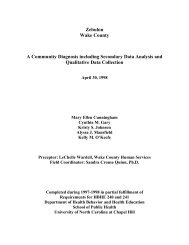
![The Health bulletin [serial] - University of North Carolina at Chapel Hill](https://img.yumpu.com/35643061/1/167x260/the-health-bulletin-serial-university-of-north-carolina-at-chapel-hill.jpg?quality=85)
![Biennial report of the North Carolina State Board of Health [serial]](https://img.yumpu.com/34024350/1/166x260/biennial-report-of-the-north-carolina-state-board-of-health-serial.jpg?quality=85)
